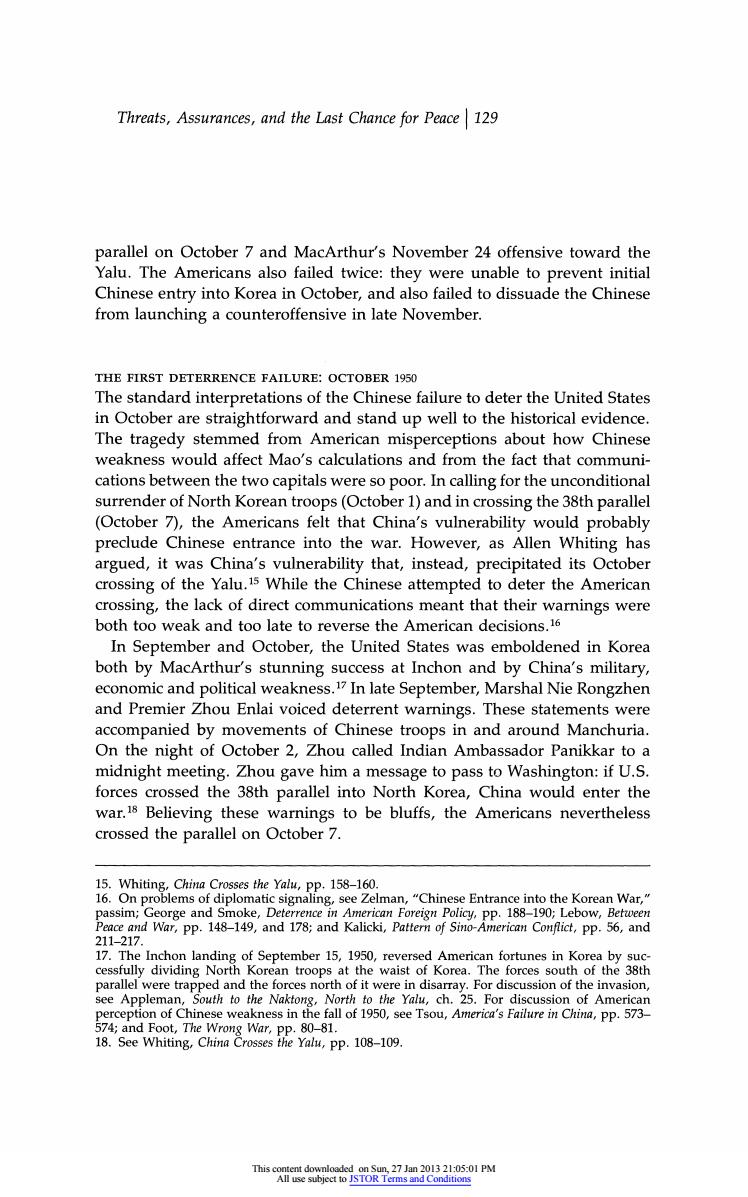正在加载图片...

Threats,Assurances,and the Last Chance for Peace 129 parallel on October 7 and MacArthur's November 24 offensive toward the Yalu.The Americans also failed twice:they were unable to prevent initial Chinese entry into Korea in October,and also failed to dissuade the Chinese from launching a counteroffensive in late November. THE FIRST DETERRENCE FAILURE:OCTOBER 1950 The standard interpretations of the Chinese failure to deter the United States in October are straightforward and stand up well to the historical evidence. The tragedy stemmed from American misperceptions about how Chinese weakness would affect Mao's calculations and from the fact that communi- cations between the two capitals were so poor.In calling for the unconditional surrender of North Korean troops(October 1)and in crossing the 38th parallel (October 7),the Americans felt that China's vulnerability would probably preclude Chinese entrance into the war.However,as Allen Whiting has argued,it was China's vulnerability that,instead,precipitated its October crossing of the Yalu.15 While the Chinese attempted to deter the American crossing,the lack of direct communications meant that their warnings were both too weak and too late to reverse the American decisions.16 In September and October,the United States was emboldened in Korea both by MacArthur's stunning success at Inchon and by China's military, economic and political weakness.17 In late September,Marshal Nie Rongzhen and Premier Zhou Enlai voiced deterrent warnings.These statements were accompanied by movements of Chinese troops in and around Manchuria. On the night of October 2,Zhou called Indian Ambassador Panikkar to a midnight meeting.Zhou gave him a message to pass to Washington:if U.S. forces crossed the 38th parallel into North Korea,China would enter the war.18 Believing these warnings to be bluffs,the Americans nevertheless crossed the parallel on October 7. 15.Whiting,China Crosses the Yalu,pp.158-160. 16.On problems of diplomatic signaling,see Zelman,"Chinese Entrance into the Korean War," passim;George and Smoke,Deterrence in American Foreign Policy,pp.188-190;Lebow,Between Peace and War,pp.148-149,and 178;and Kalicki,Pattern of Sino-American Conflict,pp.56,and 211-217. 17.The Inchon landing of September 15,1950,reversed American fortunes in Korea by suc- cessfully dividing North Korean troops at the waist of Korea.The forces south of the 38th parallel were trapped and the forces north of it were in disarray.For discussion of the invasion, see Appleman,South to the Naktong,North to the Yalu,ch.25.For discussion of American perception of Chinese weakness in the fall of 1950,see Tsou,America's Failure in China,pp.573- 574;and Foot,The Wrong War,pp.80-81. 18.See Whiting,China Crosses the Yalu,pp.108-109. This content downloaded on Sun,27 Jan 2013 21:05:01 PM All use subject to JSTOR Terms and ConditionsThreats, Assurances, and the Last Chance for Peace | 129 parallel on October 7 and MacArthur's November 24 offensive toward the Yalu. The Americans also failed twice: they were unable to prevent initial Chinese entry into Korea in October, and also failed to dissuade the Chinese from launching a counteroffensive in late November. THE FIRST DETERRENCE FAILURE: OCTOBER 1950 The standard interpretations of the Chinese failure to deter the United States in October are straightforward and stand up well to the historical evidence. The tragedy stemmed from American misperceptions about how Chinese weakness would affect Mao's calculations and from the fact that communications between the two capitals were so poor. In calling for the unconditional surrender of North Korean troops (October 1) and in crossing the 38th parallel (October 7), the Americans felt that China's vulnerability would probably preclude Chinese entrance into the war. However, as Allen Whiting has argued, it was China's vulnerability that, instead, precipitated its October crossing of the Yalu.15 While the Chinese attempted to deter the American crossing, the lack of direct communications meant that their warnings were both too weak and too late to reverse the American decisions.16 In September and October, the United States was emboldened in Korea both by MacArthur's stunning success at Inchon and by China's military, economic and political weakness.17 In late September, Marshal Nie Rongzhen and Premier Zhou Enlai voiced deterrent warnings. These statements were accompanied by movements of Chinese troops in and around Manchuria. On the night of October 2, Zhou called Indian Ambassador Panikkar to a midnight meeting. Zhou gave him a message to pass to Washington: if U.S. forces crossed the 38th parallel into North Korea, China would enter the war.18 Believing these warnings to be bluffs, the Americans nevertheless crossed the parallel on October 7. 15. Whiting, China Crosses the Yalu, pp. 158-160. 16. On problems of diplomatic signaling, see Zelman, "Chinese Entrance into the Korean War," passim; George and Smoke, Deterrence in American Foreign Policy, pp. 188-190; Lebow, Between Peace and War, pp. 148-149, and 178; and Kalicki, Pattern of Sino-American Conflict, pp. 56, and 211-217. 17. The Inchon landing of September 15, 1950, reversed American fortunes in Korea by successfully dividing North Korean troops at the waist of Korea. The forces south of the 38th parallel were trapped and the forces north of it were in disarray. For discussion of the invasion, see Appleman, South to the Naktong, North to the Yalu, ch. 25. For discussion of American perception of Chinese weakness in the fall of 1950, see Tsou, America's Failure in China, pp. 573- 574; and Foot, The Wrong War, pp. 80-81. 18. See Whiting, China Crosses the Yalu, pp. 108-109. This content downloaded on Sun, 27 Jan 2013 21:05:01 PM All use subject to JSTOR Terms and Conditions